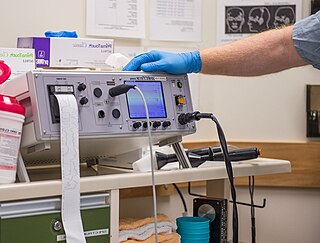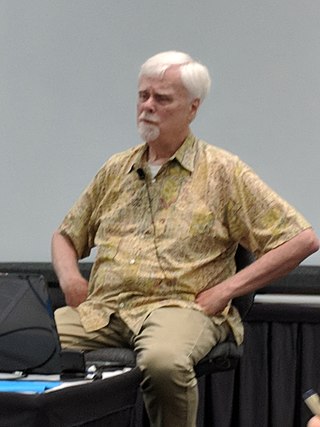
Electroconvulsive therapy (ECT) or electroshock therapy (EST) is a psychiatric treatment where a generalized seizure is electrically induced to manage refractory mental disorders. Typically, 70 to 120 volts are applied externally to the patient's head, resulting in approximately 800 milliamperes of direct current passing between the electrodes, for a duration of 100 milliseconds to 6 seconds, either from temple to temple or from front to back of one side of the head. However, only about 1% of the electrical current crosses the bony skull into the brain because skull impedance is about 100 times higher than skin impedance.
Richard Bentall is a Professor of Clinical Psychology at the University of Sheffield in the UK.

Manfred Joshua Sakel was an Austrian-Jewish neurophysiologist and psychiatrist, credited with developing insulin shock therapy in 1927.
Peter Roger Breggin is an American anti-establishment psychiatrist who has long been outspokenly critical of widely used evidence-based treatments within psychiatry(psychiatric medication) and medical care in general. Breggin now lives in the Finger Lakes, Central New York.
Biological psychiatry or biopsychiatry is an approach to psychiatry that aims to understand mental disorder in terms of the biological function of the nervous system. It is interdisciplinary in its approach and draws on sciences such as neuroscience, psychopharmacology, biochemistry, genetics, epigenetics and physiology to investigate the biological bases of behavior and psychopathology. Biopsychiatry is the branch of medicine which deals with the study of the biological function of the nervous system in mental disorders.
Mental disorders are classified as a psychological condition marked primarily by sufficient disorganization of personality, mind, and emotions to seriously impair the normal psychological and often social functioning of the individual. Individuals diagnosed with certain mental disorders can be unable to function normally in society. Mental disorders may consist of several affective, behavioral, cognitive and perceptual components. The acknowledgement and understanding of mental health conditions has changed over time and across cultures. There are still variations in the definition, classification, and treatment of mental disorders.

David D. Burns is an American psychiatrist and adjunct professor emeritus in the Department of Psychiatry and Behavioral Sciences at the Stanford University School of Medicine. He is the author of bestselling books such as Feeling Good: The New Mood Therapy, The Feeling Good Handbook and Feeling Great: The Revolutionary New Treatment for Depression and Anxiety.
Management of depression is the treatment of depression that may involve a number of different therapies: medications, behavior therapy, psychotherapy, and medical devices.
Adam Scott Radomsky is a Canadian psychologist who studies obsessive-compulsive disorder (OCD) and related anxiety disorders. He is a professor in the Department of Psychology at Concordia University in Montreal, Canada, and was editor-in-chief of the Journal of Behavior Therapy and Experimental Psychiatry.

Sarah H. Lisanby is an American psychiatrist who studies the use of neurostimulation devices to treat mental illness. Since 2015 she has directed the division of the National Institute of Mental Health(NIMH) working on translational research.

Gerhard Andersson is a Swedish psychologist, psychotherapist and Professor of clinical psychology at Linköping University. He was previously affiliated researcher at Karolinska Institutet. He was a co-recipient of the Nordic Medical Prize in 2014.
Igor Grant is an American psychiatrist. He is Distinguished Professor in the Department of Psychiatry in the School of Medicine at the University of California, San Diego. He is Director of the HIV Neurobehavioral Research Program (HNRP) and the Center for Medicinal Cannabis Research (CMCR). Grant is the founding Editor of the Journal of the International Neuropsychological Society and founding co-editor of the journal AIDS and Behavior. His work focuses on effects of HIV and drug use, particularly alcohol, medical marijuana, and methamphetamine.

David John Impastato was an American neuropsychiatrist who pioneered the use of electroconvulsive therapy (ECT) in the United States. A treatment for mental illness initially called "electroshock," ECT was developed in 1937 by Dr. Ugo Cerletti and Lucio Bini, working in Rome. Impastato has been credited with the earliest documented use of the revolutionary method in North America, administered in early 1940 to a schizophrenic female patient in New York City. Soon after, he and colleague Dr. Renato Almansi completed the first case study of ECT to appear in a U.S. publication. Impastato spent the next four decades refining the technique, gaining recognition as one of its most authoritative spokesmen. He taught, lectured widely and published over fifty articles on his work. He called on ECT practitioners to observe the strictest protocols of patient safety, countered resistance to ECT from both the medical and cultural establishments, and met later challenges to electroconvulsive therapy from developments in psychopharmacology. Impastato would live to see ECT recommended by the American Psychiatric Association for a distinct core of intractable mental disorders. The U.S. Food and Drug Administration took longer to respond to the treatment's potential. But in 2016 the FDA drafted guidelines for ECT similar to those of the APA, as well as proposing regulations for treatment with Class II and Class III devices. Though still not free of controversy, electroconvulsive therapy is the treatment of choice for an estimated 100,000 patients a year in the United States.
Augustus John Rush is an internationally renowned psychiatrist. He is a professor emeritus in Duke-NUS Medical School at the National University of Singapore (NUS), and adjunct professor of psychiatry and behavioral sciences at Duke University School of Medicine. He has authored and edited more than 10 books, and over 600 scientific journal articles that are largely focused on the diagnosis and treatment of depressive and bipolar disorders.
Electroconvulsive therapy (ECT) is a controversial therapy used to treat certain mental illnesses such as major depressive disorder, schizophrenia, depressed bipolar disorder, manic excitement, and catatonia. These disorders are difficult to live with and often very difficult to treat, leaving individuals suffering for long periods of time. In general, ECT is not looked at as a first line approach to treating a mental disorder, but rather a last resort treatment when medications such as antidepressants are not helpful in reducing the clinical manifestations.

David H. Barlow is an American psychologist and Professor Emeritus of Psychology and Psychiatry at Boston University. He is board certified by the American Board of Professional Psychology. Barlow is known for his research and publications on the etiology, nature, and treatment of anxiety disorders. The models and treatment methods that he developed for anxiety and related disorders are widely used in clinical training and practice. Barlow is one of the most frequently cited psychologists in the world.
Anne Marie Albano is a clinical psychologist known for her clinical work and research on psychosocial treatments for anxiety and mood disorders, and the impact of these disorders on the developing youth. She is the CUCARD professor of medical psychology in psychiatry at Columbia University, the founding director of the Columbia University Clinic for Anxiety and Related Disorders (CUCARD), and the clinical site director at CUCARD of the New York Presbyterian Hospital's Youth Anxiety Center.
Robert D. Kerns is an American clinical psychologist, academic and author. He is Professor Emeritus of Psychiatry, Neurology and Psychology at Yale University and Senior Research Scientist of Psychiatry at the Yale School of Medicine. He is also a Program Director of National Institutes of Health, Department of Defense and Department of Veterans Affairs Pain Management Collaboratory Coordinating Center.
Steven D. Hollon is an American psychologist, academic and researcher. He is the Gertrude Conaway Vanderbilt Professor of Psychology at Vanderbilt University.
Keith Stephen Dobson is a Canadian psychologist, academic and researcher. He is a professor of Clinical Psychology at the University of Calgary in Canada and has also served as Head of Psychology Department and Director of the Clinical Psychology program at the university. He is President of the World Confederation of Cognitive and Behavioral Therapies.







